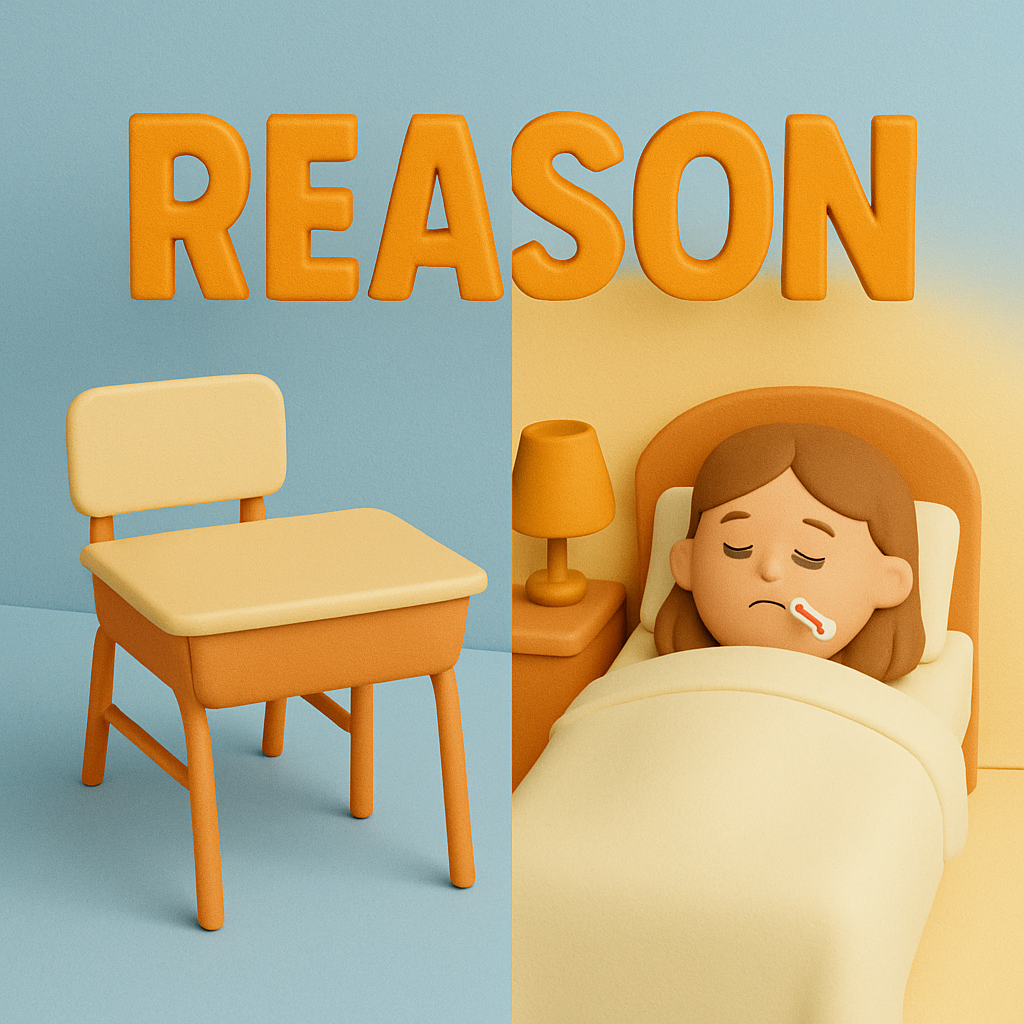Reason
Definition
The term "reason" refers to the ability to think, understand, and form judgments logically, as well as the cause, explanation, or justification for an action or event.
Parts of Speech
- Noun
- Verb
Pronunciation
American English
- IPA Pronunciation: /ˈriː.zən/
- Respelling: REE-zuhn
British English
- IPA Pronunciation: /ˈriː.zən/
- Respelling: REE-zuhn
Etymology
The word "reason" originates from the Latin "ratio," meaning "reckoning, understanding, or explanation," derived from "reri" (to reckon or calculate). It entered Old French as "raison" and subsequently Middle English in the 14th century.
Derivatives
- Reasonable (adjective)
- Reasoning (noun)
- Unreason (noun)
- Reasoner (noun)
- Overreason (verb)
Synonyms
- Logic
- Rationale
- Justification
Antonyms
- Unreason
- Illogic
- None
Usage
The term "reason" is frequently used in both intellectual and everyday contexts. For example, "The reason for the delay was traffic congestion," or "Humans have the capacity to reason logically."
Related Terms
- Logic: The study of reasoning and argumentation.
- Rationale: A set of reasons or logical basis for an action.
- Cause: The reason something happens.
Detailed Definitions
Noun
- The power of the mind to think, understand, and form judgments logically:
- Example: "His reason helped him solve the complex problem."
- A cause, explanation, or justification for an action or event:
- Example: "The reason for her absence was illness."
- A basis or motive for something:
- Example: "She had a valid reason for her decision."
Verb
- To think, understand, and form judgments logically:
- Example: "He reasoned that it would be better to wait until morning."
- To provide an explanation or justification:
- Example: "She reasoned her choice with a detailed explanation."
reason



🇨🇳 Mandarin
- 原因 (yuányīn) - cause or explanation
- IPA Pronunciation: /yɛn˥ in˥/
- English Respelling: yuan-yin
- 理由 (lǐyóu) - logic or rational thought
- IPA Pronunciation: /li˥˩ joʊ̯˧˥/
- English Respelling: li-you
🇮🇳 Hindi
- कारण (karan) - cause or explanation
- IPA Pronunciation: /kaːɾən/
- English Respelling: ka-ran
- तर्क (tark) - logic or rational thought
- IPA Pronunciation: /t̪əɾk/
- English Respelling: tark
🇪🇸 Spanish
- Razón - cause or explanation, logic or rational thought
- IPA Pronunciation: /raˈθon/ (Spain), /raˈson/ (Latin America)
- English Respelling: ra-thon (Spain), ra-son (Latin America)
🇫🇷 French
- Raison - cause or explanation, logic or rational thought
- IPA Pronunciation: /ʁɛzɔ̃/
- English Respelling: rez-on
🇸🇦 Modern Standard Arabic
- سبب (sabab) - cause or explanation
- IPA Pronunciation: /sæbæb/
- English Respelling: sa-bab
- عقل (aql) - logic or rational thought
- IPA Pronunciation: /ʕaql/
- English Respelling: a-qul
🇧🇩 Bengali
- কারণ (karan) - cause or explanation
- IPA Pronunciation: /kaɹon/
- English Respelling: ka-ron
- যুক্তি (jukti) - logic or rational thought
- IPA Pronunciation: /d͡ʒukt̪i/
- English Respelling: juk-ti
🇷🇺 Russian
- Причина (prichina) - cause or explanation
- IPA Pronunciation: /ˈprʲit͡ɕɪnə/
- English Respelling: pri-chi-na
- Разум (razum) - logic or rational thought
- IPA Pronunciation: /ˈrazʊm/
- English Respelling: ra-zum
🇵🇹 Portuguese
- Razão - cause or explanation, logic or rational thought
- IPA Pronunciation: /ʁɐˈzɐ̃w̃/
- English Respelling: ra-zown
🇮🇩 Indonesian
- Alasan - cause or explanation
- IPA Pronunciation: /a'lasan/
- English Respelling: a-la-san
- Logika - logic or rational thought
- IPA Pronunciation: /lo'gika/
- English Respelling: lo-gi-ka
🇩🇪 German
- Grund - cause or explanation
- IPA Pronunciation: /ɡʁʊnt/
- English Respelling: grunt
- Vernunft - logic or rational thought
- IPA Pronunciation: /fɛɐ̯ˈnʊnft/
- English Respelling: fer-nunft
🇯🇵 Japanese
- 理由 (riyuu) - cause or explanation
- IPA Pronunciation: /ɾijɯ̟ː/
- English Respelling: ri-yu
- 理性 (risei) - logic or rational thought
- IPA Pronunciation: /ɾiseː/
- English Respelling: ri-se
🇻🇳 Vietnamese
- Lý do - cause or explanation
- IPA Pronunciation: /li˧ˀ˥ʔ do˧/
- English Respelling: ly do
- Lý trí - logic or rational thought
- IPA Pronunciation: /li˧ˀ˥ʔ tri˧˥/
- English Respelling: ly tri
🇰🇷 Korean
- 이유 (iyu) - cause or explanation
- IPA Pronunciation: /i.ju/
- English Respelling: i-yu
- 이성 (iseong) - logic or rational thought
- IPA Pronunciation: /i.sʌŋ/
- English Respelling: i-seong
🇹🇷 Turkish
- Sebep - cause or explanation
- IPA Pronunciation: /sebep/
- English Respelling: se-bep
- Mantık - logic or rational thought
- IPA Pronunciation: /mantɯk/
- English Respelling: man-tik
🇵🇰 Urdu
- وجہ (wajah) - cause or explanation
- IPA Pronunciation: /wəd͡ʒɦ/
- English Respelling: wa-jah
- منطق (mantaq) - logic or rational thought
- IPA Pronunciation: /məntɪq/
- English Respelling: man-tiq





